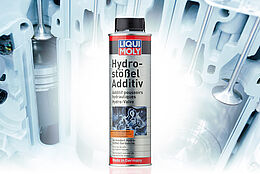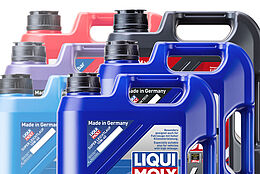- 11/13/2025
- 4min
What are the differences between various motor oils?

Which motor oil types exist?
Mineral oils
Mineral oil is extracted from crude petroleum. The so-called refining process removes impurities and unwanted carbons from the crude oil. Various additive packages can then be added to enhance the properties of the oil.
In contrast to synthetic oils, mineral oils are limited in their performance due to increasing requirements such as extended oil change intervals, increasing power density and the requirement for low-viscosity characteristics.
Synthetic oils
In the case of synthetic oils, a distinction is made between two different manufacturing processes. In the first variant, the oil is produced by polymerization. PAO oils are superior to mineral oils in terms of lubrication performance, operating temperature range and flow properties. However, they are very expensive to manufacture and can no longer meet the high requirements of modern engines, which is why PAO oils are becoming less important.
With the second approach, the oil is produced by hydrocracking, which is why these oils are also called HC oils. Today, HC oils offer the best possible performance for all modern engines. Due to continuous further development, almost all oil development today is based on this synthesis technology. These oils meet the highest quality standards according to API and ACEA, which is confirmed by official approvals from the vehicle manufacturers.
The designation specifications for synthetic oil and mineral oil may vary internationally.
What is the significance of the viscosity of a motor oil?
The viscosity indicates the flow resistance of an oil or how viscous it is. Two numbers are used for the correct designation. The first number is always marked with a “W”, which stands for “winter”. The number thus indicates the lower operating temperature of the motor oil. The number stands for the fluidity at an oil temperature of 100 °C, because motor oils are naturally more viscous at low temperatures than when heated.
Here the rule is: The lower the number is, the thinner the oil. For example, a 5W-40 oil is thinner at a low cold-start temperature than a motor oil with a viscosity of 10W-40. A 10W-30 is thinner than a 10W-40 at an oil operating temperature of 100 °C.
However, viscosity alone is not a quality characteristic.

Why are motor oils becoming thinner and thinner?
The thinner a motor oil is, the less force the engine needs to apply to pump it through the circuit. This reduces fuel consumption, which supports the constant efforts of the car manufacturers in reducing vehicle emissions.
The thinner a motor oil becomes, the more important the role of the additives. In the past, the base oil was the most important performer in motor oil, but today it is the additive packages. Almost a third of modern oils consists of additive packages. Only these ensure cleaning, corrosion protection, cooling and lubrication for the extremely thin-bodied oils. The actual oil is often only the carrier fluid of the additive packages.
Which oil for which vehicle?
When selecting the right motor oil, it is primarily crucial that the specifications specified by the manufacturer are met. There are now more than 50 different manufacturer approvals. Before buying a motor oil, it is therefore essential to take a look at the vehicle manual and check what requirements the oil must meet.
With our oil guide, you can find the right motor oil for your vehicle in just a few seconds.





























